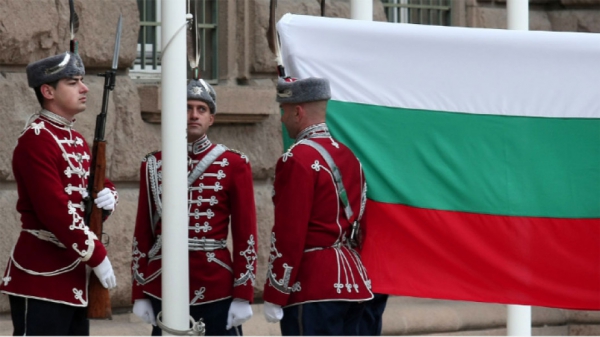The Bulgarian national flag is three-coloured and consists of white, green and red colours, placed horizontally, reads the Law for the State Seal and National Flag of the Republic of Bulgaria, while its colours and their order is connected with Stiliana Paraskevova and the flag of Braila.
“The history of the Bulgarian flag goes back to 1862 when the three colours first appeared on the uniforms of the First Bulgarian Legion, set up by Rakovski. The three colours were put in their present order for the first time on the flag designed in the Romanian town of Braila by a merchant and a champion of the national cause – Ivan Paraskevov,” Lilia Krivorova from the National Museum of Military History says. “He entrusted his 14-year old daughter Stiliana with making and embroidering the flag, and work on it, which spanned 6 months, was kept a secret until the flag was ready in April 1877.”
There is an embroidered lion on its hind legs with a crown on its head on the flag, but it disappears during the discussion of the constitution of the newly liberated Principality of Bulgaria.
“It turns out there is no text in the constitution about the flag. After brief deliberations, on 26 March, 1879, the MPs voted article 23, thus legalizing the colours of the national flag, omitting the lion. According to the researcher of the flag of Braila colonel Ivan Stoychev, this happened in a haste,” Lilia Krivorova says. “In 1881 the Braila flag was handed over to the prince’s palace. It was only in 1930, two years before her death that Stiliana Paraskevova found out that the flag she had made was there and got permission to see it. The last time she saw her handiwork she kissed it and cried. After 1937, Stiliana’s own signature, embroidered in the lower corner of the flag, was cut away, nobody knows by whom or when.”
The Braila flag is currently in safe-keeping in a special repository of the Museum of Military History along with other battle flags.
“A constant temperature is maintained and there is no direct sunlight. The flag has undergone restoration and conservation twice – in 1965 and in 1984. It was shown to the general public on 3 March, 2014 as part of an exhibition dedicated to the symbols of Bulgarian statehood, and also on 3 March, 2017 on the occasion of the 140th anniversary of the start of the Russo-Turkish war. There is a copy of the flag though it is not on permanent display,” Lilia Krivorova says.
The national flag remained unchanged until the end of World War 2. When the constitution of the People’s Republic of Bulgaria was adopted in 1947 the lion made its reappearance, though this time without a crown, and in 1991 the 7th Grand National Assembly took the coat of arms off the national flag and it has remained unaltered ever since.
“Many people think there is a coat of arms on the Bulgarian flag but there isn’t the coat of arms is a separate constitutional symbol. Many have no idea that the Bulgarian flag is not produced, it is reproduced because such are the words used in the Law, and it meets very specific standards and rules,” says Atanaska Velcheva whose company was the first certified company in Bulgaria with permission to reproduce the Bulgarian flag. “The colours are strictly fixed according to the Pantone scale. The shape is rectangular in a 3-5 length/width ratio. The largest hoisted flag is 14x23 meters and it is put up in Varna. However, the largest Bulgarian flag we have made was for the folklore festival on Rozhen Peak 2016. It is 26 meters large and 300 meters long."
The thread and the seams also have to meet strict requirements, and that is true even of the hems.
“It is not just stitching three pieces of cloth together,” Atanaska Velcheva goes on to say. “I am very proud to be making the national symbol. In my line of work I get to meet people who are proud of their country, and when I see people like them I firmly believe that Bulgaria will continue to exist for centuries to come.”
Media Link : 140 години от узаконяването на знамето на България




